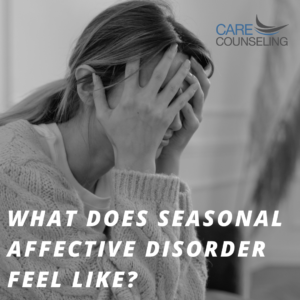Understanding Seasonal Affective Disorder (SAD)
 As the seasons change and the days become shorter and darker, some individuals find themselves experiencing a noticeable shift in their mood and overall well-being. In this blog post, we’ll explore what Seasonal Affective Disorder feels like, its common symptoms, and strategies to cope with this condition.
As the seasons change and the days become shorter and darker, some individuals find themselves experiencing a noticeable shift in their mood and overall well-being. In this blog post, we’ll explore what Seasonal Affective Disorder feels like, its common symptoms, and strategies to cope with this condition.
What is Seasonal Affective Disorder?
Seasonal Affective Disorder is a subtype of major depressive disorder. It is characterized by recurrent episodes of depression that occur during specific seasons, usually fall and winter. The exact cause of SAD is not fully understood, but it is thought to be related to reduced exposure to sunlight, which can disrupt the body’s internal clock and affect the production of certain neurotransmitters like serotonin and melatonin.
What Does Seasonal Affective Disorder Feel Like?
- Persistent Sadness: One of the hallmark symptoms of SAD is a deep and persistent feeling of sadness or hopelessness. This emotional state can make everyday activities feel burdensome and joyless.
- Low Energy: Individuals with SAD often experience a significant decrease in energy levels. They may feel fatigued and lethargic throughout the day, making it difficult to accomplish tasks or engage in activities they once enjoyed.
- Changes in Sleep Patterns: SAD can disrupt sleep patterns. Some people may find themselves oversleeping and struggling to get out of bed in the morning, while others may experience insomnia or disrupted sleep.
- Appetite Changes: Cravings for carbohydrates and sugary foods are common among those with SAD. This can lead to weight gain and a sense of guilt or shame.
- Difficulty Concentrating: Concentration and focus may become impaired, making it challenging to perform well at work or school.
- Loss of Interest: People with SAD often lose interest in activities they typically find pleasurable, which can lead to social withdrawal and isolation.
- Irritability: Increased irritability and moodiness are also common symptoms of SAD. Small annoyances may feel overwhelming, and relationships may become strained.
- Physical Symptoms: Some individuals with SAD experience physical symptoms such as headaches and body aches, which can further contribute to their distress.
Coping with Seasonal Affective Disorder:
If you or someone you know is experiencing symptoms of Seasonal Affective Disorder, there are effective strategies to manage and alleviate its impact:
- Light Therapy: Light therapy, or phototherapy, involves sitting in front of a specialized lightbox that emits bright, full-spectrum light. Regular use of light therapy can help regulate the body’s internal clock and improve mood.
- Counseling and Psychotherapy: Cognitive-behavioral therapy (CBT) and other forms of psychotherapy can provide individuals with valuable coping skills and strategies to manage their symptoms.
- Medication: In some cases, healthcare providers may recommend antidepressant medications to help alleviate the symptoms of SAD. Consult a healthcare professional for proper evaluation and prescription.
- Exercise: Regular physical activity, especially outdoor exercise during daylight hours, can boost mood and energy levels. Even a short walk can make a significant difference.
- Dietary Changes: Be mindful of your diet during the winter months. Try to maintain a balanced diet and limit excessive consumption of carbohydrates and sugar.
- Mindfulness and Relaxation Techniques: Practices like meditation, deep breathing, and progressive muscle relaxation can help reduce stress and improve mood.
- Social Support: Stay connected with friends and loved ones. Social support is crucial for mental health, and spending time with others can provide emotional comfort.
- Maintain a Routine: Establish a daily routine, even on dark and gloomy days. Consistency in daily activities can help stabilize mood.
Seasonal Affective Disorder can significantly impact a person’s life, making it important to recognize its symptoms and seek appropriate support and treatment. If you or someone you know is struggling with SAD, remember that effective treatments are available, and with the right strategies, it is possible to manage this condition and find relief from its debilitating symptoms. Don’t hesitate to reach out to healthcare professionals for guidance and support in managing Seasonal Affective Disorder.


























